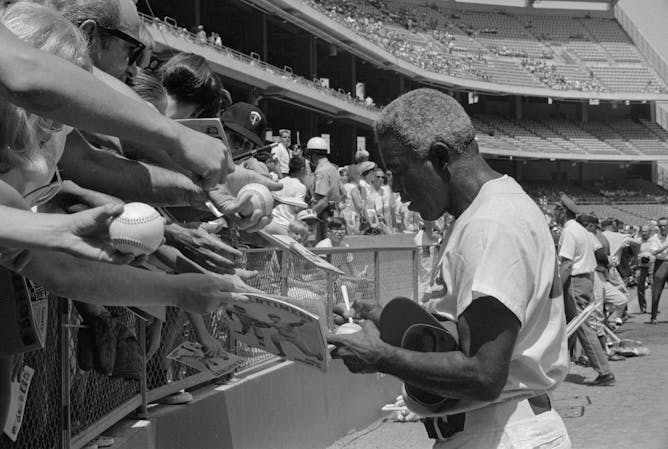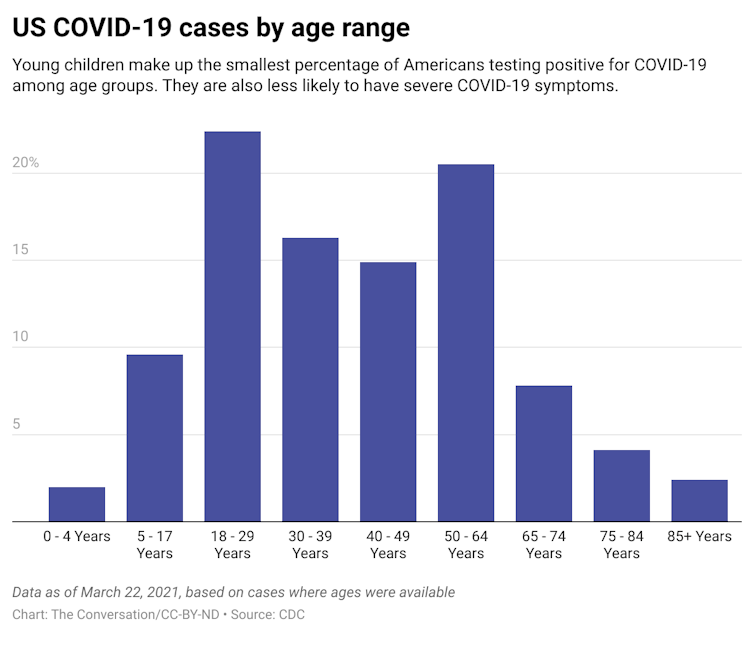|
Jackie Robinson was a hero on and off the baseball diamond, becoming a star athlete in college and a civil rights advocate before and after he integrated major league baseball.
Robinson’s life, however, was short; he died at 53. That was long before people knew much about Black-white health gaps. Years later, it’s worth asking: Did the racism he faced contribute to an early death? Three scholars of health disparities explain how racism harms Black people’s health and shortens their lives, affecting even the strongest and the most stoic.
Also today:
|

Adoring fans clamor for an autograph from baseball legend Jackie Robinson in 1962, but Robinson faced slurs, hatred and insults in his early years in the majors.
Bettman/
Tamra Burns Loeb, University of California, Los Angeles; Alicia Morehead-Gee, Charles R. Drew University of Medicine and Science; Derek Novacek, UCLA School of Medicine
Major league baseball opens today, and few are likely to give race a thought. When Jackie Robinson integrated MLB in 1947, it was a far different story. Did racism lead to Robinson's early death?
|
Education
|
-
Brandon Guthrie, University of Washington
In-person learning can safely resume as long as schools take steps to mitigate the spread of COVID-19.
|
|
Health
|
-
James B. Wood, Indiana University School of Medicine
Early testing results look promising, and a vaccine will likely be authorized for teens by fall. That doesn't mean putting away the face masks, though.
-
Matthew Woodruff, Emory University
Many people never experience the least bit of discomfort from the COVID-19 vaccines, but mild side effects are common. They include swelling in the affected arm, nausea and chills.
-
Marc Cohen, University of Massachusetts Boston; Jane Tavares, University of Massachusetts Boston
The findings suggest that many Black and Hispanic Americans don't believe health care providers are listening to them.
|
|
Arts + Culture
|
-
Amy M. Alvarez, West Virginia University; Jameka Hartley, University of Alabama
Three decades after poet Frank X. Walker coined the term 'Affrilachia,' the region's poets and artists continue to create work that probes the world of a people long ignored.
|
|
Ethics + Religion
|
-
Monique Deal Barlow, Georgia State University
Christian nationalists are far less likely to be vaccinated than other groups, research has found. Some evangelical leaders are trying to counter vaccine misinformation.
|
|
Politics + Society
|
-
Michael David Cohen, American University
Riots by proslavery forces raged for three days in the nation's capital after the capture of a ship bearing fugitive enslaved people. The president, a slaveowner himself, tried to calm the city.
|
|
Science + Technology
|
-
Caitlin Clark, Colorado State University
Sauerkraut, sourdough, beer...and chocolate? They're all fermented foods that rely on microbes of various types to transform the flavor of their raw ingredients into something totally different.
|
|
Environment + Energy
|
-
Diane Kim, USC Dornsife College of Letters, Arts and Sciences; Ignacio Navarrete, USC Dornsife College of Letters, Arts and Sciences; Jessica Dutton, USC Dornsife College of Letters, Arts and Sciences
Making biofuels from crops grown on land poses trade-offs between food and fuel. A new study looks offshore.
|
|
Trending on site
|
-
Kiersten Formoso, USC Dornsife College of Letters, Arts and Sciences
Hollywood loves a good monster battle, and where better to turn for inspiration than the animal kingdom? Traits from real animals can provide clues about the fighting prowess of Kong and Godzilla.
-
Jay A. Irwin, University of Nebraska Omaha
Trans Day of Visibility, celebrated March 31, is a day to honor the trans community and counter transphobia.
-
Jerry Davis, University of Michigan
Tech companies' use of dual-class share structures to keep control in the hands of founders and other insiders gives a handful of people power over enormous swaths of American life.
Today’s graphic

|
|